Understanding Cancer and GMOs
Genetically Modified Foods (GMOs)
Genetically modified (GM) food has been around for decades. Most corn and soy purchased in the United States is GM food. Proponents argue that there are no ill effects on humans with GM food but I completely disagree. I’m not in the minority with my belief that changing the genetic structure of a food product is playing with disaster. Recent studies reveal that GM corn destroys the intestinal lining of mice causing absorption problems and leaky gut syndrome. What is it doing to our gut?

Today’s GMOs are based on adding new genes to crops like corn, soy, and cotton in order to alter the way the plants function, make them more tolerant to disease and bugs, and able companies to patent the seed and create an endless need for farmers to repurchase, year after year. Gone are the days of saving seeds; it’s against the law – Monsanto owns the patent. To say that our food supplies, laced with toxins, filled with additives, colorings and chemicals, and now genetically altered don’t negatively affect our bodies is ludicrous. This book does not contain enough space to discuss these things in detail and I have recommended various books for your personal research, but it suffices to say that removing these poisons from your diet is of utmost importance.
In order to make crops more resistant to pests, scientists insert a special gene, called Bt-toxin – derived from Bacillus thuringiensis bacteria – into corn and cotton plants. The toxin attacks the stomach lining of nibbling insects, killing the pests within a couple of days of ingestion. More than 65 percent of U.S. corn crops contain this special gene that produces the insecticide.
Another alarming fact: 80% of the processed food items in your local supermarket contain genetically modified ingredients. This means that if you are a U. S resident, you are undoubtedly eating genetically modified foods.
These genetically modified foods have been sneaking into our diets since 1995, when the Environmental Protection Agency (EPA) analyzed the first genetically engineered plant – corn. Today, 90% of several U.S. crops are grown with genetically engineered seed.

Bottom line: Eat only organically grown foods. Do your own research into the foods you put into your mouth and make sure they are not genetically modified. If we all create a greater demand for good food, the supply will follow.\
Some ways to curb your intake of GM foods
- Know the most commonly modified crops. Soybeans, corn, cotton (for oil), canola (for oil), squash, zucchini and papaya are all popular GMOs. Find other GM crops.
- Buy organic foods. Organic foods are grown from non-GMO seeds.
- Buy meats from grass-fed animals. Cows, chickens, pigs and even farmed fish are often on a diet of genetically modified corn or alfalfa. Check that your meat is from animals that are grass-fed or pasture-fed.
- Read the labels. The top two genetically modified crops are corn and soy. They’re also the most widely used ingredients. Avoid products that contain ingredients like corn syrup and soy lecithin.
- Buy brands labeled as non-GM or GMO free. Some products are labeled as non-GM or GMO-free. Meaning, they do not use genetically modified ingredients. GMO-free food sources are listed on the Non-GMO Project website.
- Shop at local farmers markets. Most GM foods come from large industrial farms. Shop at local farmers markets or sign-up for a co-op.
10 Reasons to Avoid GMOs
1. GMOs are unhealthy
The American Academy of Environmental Medicine (AAEM) urges doctors to prescribe non-GMO diets for all patients. They cite animal studies showing organ damage, gastrointestinal and immune system disorders, accelerated aging, and infertility. Human studies show how genetically modified (GM) food can leave material behind inside us, possibly causing long-term problems. Genes inserted into GM soy, for example, can transfer into the DNA of bacteria living inside us, and that the toxic insecticide produced by GM corn was found in the blood of pregnant women and their unborn fetuses.
Numerous health problems increased after GMOs were introduced in 1996. The percentage of Americans with three or more chronic illnesses jumped from 7% to 13% in just 9 years; food allergies skyrocketed, and disorders such as autism, reproductive disorders, digestive problems, and others are on the rise. Although there is not sufficient research to confirm that GMOs are a contributing factor, doctors groups such as the AAEM tell us not to wait before we start protecting ourselves, and especially our children who are most at risk.
The American Public Health Association and American Nurses Association are among many medical groups that condemn the use of GM bovine growth hormone, because the milk from treated cows has more of the hormone IGF-1 (insulin-like growth factor 1)―which is linked to cancer.
2. GMOs contaminate―forever
GMOs cross pollinate and their seeds can travel. It is impossible to fully clean up our contaminated gene pool. Self-propagating GMO pollution will outlast the effects of global warming and nuclear waste. The potential impact is huge, threatening the health of future generations. GMO contamination has also caused economic losses for organic and non-GMO farmers who often struggle to keep their crops pure.
3. GMOs increase herbicide use
Most GM crops are engineered to be “herbicide tolerant”―they deadly weed killer. Monsanto, for example, sells Roundup Ready crops, designed to survive applications of their Roundup herbicide.
Between 1996 and 2008, US farmers sprayed an extra 383 million pounds of herbicide on GMOs. Overuse of Roundup results in “superweeds,” resistant to the herbicide. This is causing farmers to use even more toxic herbicides every year. Not only does this create environmental harm, GM foods contain higher residues of toxic herbicides. Roundup, for example, is linked with sterility, hormone disruption, birth defects, and cancer.
 4. Genetic engineering creates dangerous side effects
4. Genetic engineering creates dangerous side effects
By mixing genes from totally unrelated species, genetic engineering unleashes a host of unpredictable side effects. Moreover, irrespective of the type of genes that are inserted, the very process of creating a GM plant can result in massive collateral damage that produces new toxins, allergens, carcinogens, and nutritional deficiencies.
5. Government oversight is dangerously lax
Most of the health and environmental risks of GMOs are ignored by governments’ superficial regulations and safety assessments. The reason for this tragedy is largely political. The US Food and Drug Administration (FDA), for example, doesn’t require a single safety study, does not mandate labeling of GMOs, and allows companies to put their GM foods onto the market without even notifying the agency. Their justification was the claim that they had no information showing that GM foods were substantially different. But this was a lie. Secret agency memos made public by a lawsuit show that the overwhelming consensus even among the FDA’s own scientists was that GMOs can create unpredictable, hard-to-detect side effects. They urged long-term safety studies. But the White House had instructed the FDA to promote biotechnology, and the agency official in charge of policy was Michael Taylor, Monsanto’s former attorney, later their vice president. He’s now the US Food Safety Czar.
6. The biotech industry uses “tobacco science” to claim product safety
Biotech companies like Monsanto told us that Agent Orange, PCBs, and DDT were safe. They are now using the same type of superficial, rigged research to try and convince us that GMOs are safe. Independent scientists, however, have caught the spin-masters red-handed, demonstrating without doubt how industry-funded research is designed to avoid finding problems, and how adverse findings are distorted or denied.
7. Independent research and reporting is attacked and suppressed
Scientists who discover problems with GMOs have been attacked, gagged, fired, threatened, and denied funding. The journal Nature acknowledged that a “large block of scientists . . . denigrate research by other legitimate scientists in a knee-jerk, partisan, emotional way that is not helpful in advancing knowledge.” Attempts by media to expose problems are also often censored.
8. GMOs harm the environment
GM crops and their associated herbicides can harm birds, insects, amphibians, marine ecosystems, and soil organisms. They reduce bio-diversity, pollute water resources, and are unsustainable. For example, GM crops are eliminating habitat for monarch butterflies, whose populations are down 50% in the US. Roundup herbicide has been shown to cause birth defects in amphibians, embryonic deaths and endocrine disruptions, and organ damage in animals even at very low doses. GM canola has been found growing wild in North Dakota and California, threatening to pass on its herbicide tolerant genes on to weeds.
9. GMOs do not increase yields, and work against feeding a hungry world
Whereas sustainable non-GMO agricultural methods used in developing countries have conclusively resulted in yield increases of 79% and higher, GMOs do not, on average, increase yields at all. This was evident in the Union of Concerned Scientists’ 2009 report Failure to Yield―the definitive study to date on GM crops and yield.
The International Assessment of Agricultural Knowledge, Science and Technology for Development (IAASTD) report, authored by more than 400 scientists and backed by 58 governments, stated that GM crop yields were “highly variable” and in some cases, “yields declined.” The report noted, “Assessment of the technology lags behind its development, information is anecdotal and contradictory, and uncertainty about possible benefits and damage is unavoidable.” They determined that the current GMOs have nothing to offer the goals of reducing hunger and poverty, improving nutrition, health and rural livelihoods, and facilitating social and environmental sustainability.
On the contrary, GMOs divert money and resources that would otherwise be spent on more safe, reliable, and appropriate technologies.
10. By avoiding GMOs, you contribute to the coming tipping point of consumer rejection, forcing them out of our food supply
Because GMOs give no consumer benefits, if even a small percentage of us start rejecting brands that contain them, GM ingredients will become a marketing liability. Food companies will kick them out. In Europe, for example, the tipping point was achieved in 1999, just after a high profile GMO safety scandal hit the papers and alerted citizens to the potential dangers. In the US, a consumer rebellion against GM bovine growth hormone has also reached a tipping point, kicked the cow drug out of dairy products by Wal-Mart, Starbucks, Dannon, Yoplait, and most of America’s dairies.



 In this Brand New 3rd Edition Dr. Kevin Conners adds almost DOUBLE the content with all new insights and practical tips on how to understand your body’s ability to heal and get back to a state of health.
In this Brand New 3rd Edition Dr. Kevin Conners adds almost DOUBLE the content with all new insights and practical tips on how to understand your body’s ability to heal and get back to a state of health.